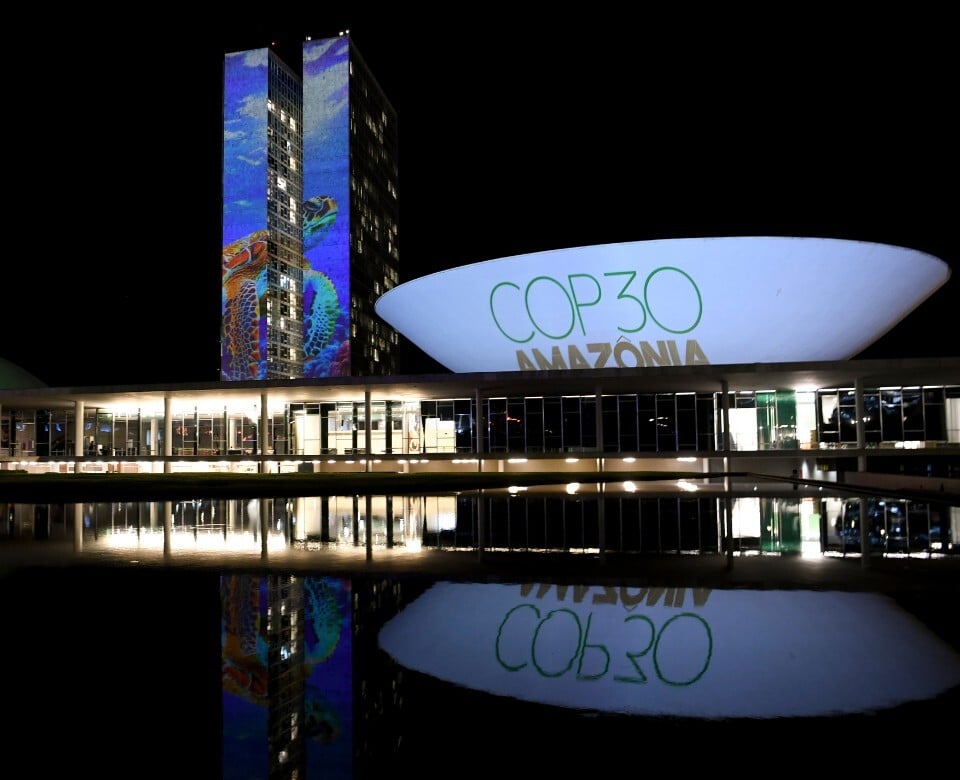
COP 30 Brazil: AI energy consumption becomes a global climate priority

Mark Chillingworth
AI energy consumption and climate change
COP 30 in Brazil brings AI’s energy consumption and climate impact into sharp focus for political, business and digital leaders.
Nature gives us peace and quiet. The silence surrounding the COP 30 climate change summit in Belém, Brazil, is almost deafening. At the Summit, it will be interesting to hear how artificial intelligence (AI) is addressed by world leaders.
There has been a growing disquiet about AI energy consumption. As leaders meet between November 10 and 21 in the city close to the Amazon rainforest, technology continues to be both part of the solution to the climate emergency, but left unchecked, also part of the problem.
Summary
- TLDR: What is COP 30 and why does it matter for digital leaders?
- The COP 30 emergency: Politics, progress and climate action
- AI and the growing environmental footprint
- Conclusion: Sustainable AI and responsible digital infrastructure
TLDR: What is COP 30 and why does it matter for digital leaders?
COP is the annual climate change conference of the United Nations (UN), and brings the world together to negotiate and analyse progress on mitigating the impact of climate change. In 2025, progress has slowed dramatically, while wildfires and droughts have once again ravaged every continent. Brazil will host and preside over this year's event, with the nation's climate diplomat André Aranha Correa as president. This may lead to better results than COP 29, which was hosted and presided over by oil-rich nation Azerbaijan.
COP 30 Brazil, notable for the absence of the United States which has decided to skip this year, is also significant in that the five-year period where the signatories to the 2015 Paris Agreement, which sought to limit the rise in global average temperatures to "well below 2°C above pre-industrial levels," review their Nationally Determined Contributions (NDCs), and put forward new NDCs. COP 30 will be judged on the strength of the NDCs.
For business and digital leaders, the action (or inaction) of global leaders on climate change has consequences, not least at a time where AI energy demand is placing a strain on the electric grid and digital infrastructure.
The COP 30 emergency: Politics, progress, and climate action
The COP meetings have been called into question by some, especially because the US has left the Paris Agreement for the second time. President Donald Trump does not believe in climate change, despite the overwhelming amount of scientific proof.
"If I look at the climate and emissions, the story is bad," Lord Adair Turner told the 2025 Schneider Electric Innovation Summit.
Turner was chair of the UK's Committee on Climate Change between 2008 and 2012. He has three positions on climate change at present, two are bad and one is good.
"The concentration of greenhouse gases in the atmosphere is still going up quite fast," he said on stage. Turner added that the self-imposed limits set out in the Paris Agreement will not be met.
The greatest threat to action is Trump, according to Turner: "The politics from America are terrible. I always knew a Trump administration would not be interested in action on climate change, but what has shocked me is the desire of the Americans to stop anybody else from taking action on climate change." But the former director of business advisors McKinsey sees hope in the shape of technology.
Marie Münster, professor in energy system analysis at the Technical University of Denmark, said at the same conference that we must remain positive about the COP process: "The work of the IPCC and the Paris Agreement has its faults, it is not perfect, but it is the best we have, so we need to put our efforts into making it work."
Not only is the COP process under threat, but as the hosts, Schneider Electric pointed out, the pace of the energy transition in Europe has stalled, which Laurent Bataille, VP for European Operations, said was also putting economic competitiveness and security at risk.
Watch The Studio roundtable debate: "Empowering IT to support the ESG mission"
AI and the growing environmental footprint
The rapid rise of Generative AI in recent years has led to growing concern that AI will exacerbate the climate emergency, and it will be interesting to see if COP 30 Brazil addresses AI and, in particular, its heavy usage in the West, which is already the leading polluter.
The West has its own problems with technology and the need for sustainable AI. The recent UK-US Tech Prosperity Deal could stretch the water and energy resources of Britain, and when the deal was announced, critics cited the water issues that US residents in Georgia were suffering due to, they claim, data centre demand.
"We have two rabbits running at different paces," says Karl Havard, Chief Commercial Officer at Nscale, a hyperscale data centre operator.
"We have AI infrastructure being developed at pace, and we have a power industry trying to keep up."
He uses a racing analogy because the AI industry is nascent, and all of its players are at full speed in a desperate attempt to win market share and technological dominance. When it comes to clean energy to power that race, Harvard says renewable energy is not available at the same rate as the AI industry demands.
As nations compete to build data centres and position themselves at the front of the AI race, as the UK has possibly done with its recent deal with the US, greenfield sites for clean energy and green data centres are hard to come by. Existing brownfield development sites, usually where former factories were situated, are being chosen; these already have energy connectivity, but it is unlikely to be from renewable sources.
"It is about time to market, how fast can you scale a technology to address the need?" says Lars B Meyer, CEO of NextWind, a German renewable energy provider.
Meyer is not suggesting that AI can only use non-renewable energy; in fact, the recent history of the clean energy sector means it is faster than other fuel sources. "The only option that scales quickly enough is renewable energy. We can get permits, develop and construct in two to three years. If you look at any other form of energy, it takes 10 years plus."
AI will continue to be an environmental challenge.
"AI in its current form is in its infancy of energy demand. The majority of that has been for training models in an arms race, so its energy use has been very predictable. As we move to a world of inference, the demand will be less predictable," Harvard says.
"Every time you write a prompt, a GPU is fired up, and the more people that use it, then that is where it becomes unknown. Training takes place when the energy is abundant," he says, adding that his organisation uses data centres in Norway that use the nation's clean hydro-electric power. Enterprise usage of AI is also in its infancy, and so it has not impacted energy demands. "AI will become ubiquitous, and that is where the energy demand will be huge."
Conclusion: Sustainable AI and responsible digital infrastructure
Before digital leaders in the HotTopics community hang their heads with technological shame, there is some good news. Technology, as we know, is an enabler and will play an ever-increasing role in combating the climate emergency.
"Over the last 50 years, with an acceleration in the last 10 years, the cost of solar PV panels has come down 99.9%. Alongside that, what is happening with batteries is quite extraordinary, with battery prices in freefall. Wind turbine costs are collapsing, and so is the pace of EV development. Taken all together, I am confident that we have the technologies to move a long way to a zero-carbon economy," Turner says.
Meyer says the financial markets fully understand and back clean energy: "If you look at the energy transition, it is an incredibly capital-intensive endeavour. In 2024, we raised $2 trillion for the transition; we need $4 trillion per year by the end of the decade. So there is still some way to go, but to get to $2 trillion is encouraging."
So delegates of COP 30 Brazil must ignore political posturing, learn from institutional investors who see the potential for clean energy to be both good for the planet and for business. In addition, they must seize the opportunity to set realistic targets for sustainable AI and responsible digital infrastructure growth, something that has never been done with previous technology epochs.
Join the ESG Supergroup to discuss sustainable AI and responsible digital infrastructure.
SUBMIT A COMMENT
RELATED ARTICLES
Join the community
To join the HotTopics Community and gain access to our exclusive content, events and networking opportunities simply fill in the form below.